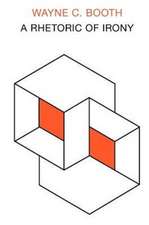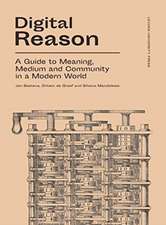Irony's Edge: The Theory and Politics of Irony
Autor Linda Hutcheonen Limba Engleză Paperback – 17 noi 1994
Irony's Edge is a fascinating, compulsively readable study of the myriad forms and the effects of irony. It sets out, for the first time, a sustained, clear analysis of the theory and the political contexts of irony, using a wide range of references from contemporary culture. Examples extend from Madonna to Wagner, from a clever quip in conversation to a contentious exhibition in a museum.
Irony's Edge outlines and then challenges all the major existing theories of irony, providing the most comprehensive and critically challengin theory of irony to date.
| Toate formatele și edițiile | Preț | Express |
|---|---|---|
| Paperback (1) | 369.73 lei 43-57 zile | |
| Taylor & Francis – 17 noi 1994 | 369.73 lei 43-57 zile | |
| Hardback (1) | 1223.61 lei 43-57 zile | |
| Taylor & Francis – 17 noi 1994 | 1223.61 lei 43-57 zile |
Preț: 369.73 lei
Nou
70.77€ • 76.90$ • 59.49£
Carte tipărită la comandă
Livrare economică 21 aprilie-05 mai
Specificații
ISBN-10: 0415054532
Pagini: 258
Ilustrații: illustrations, bibliography
Dimensiuni: 152 x 229 x 18 mm
Greutate: 0.45 kg
Ediția:1
Editura: Taylor & Francis
Colecția Routledge
Locul publicării:Oxford, United Kingdom
Cuprins
Table of Illustrations Introduction: The `Scene' of Irony Acknowledgements 1. Risky Business: The `Transideological' Politics of Irony 2. The Cutting Edge 3. Modelling Meaning: The Semantics of Irony 4. discursive Communities: How Irony `Happens' 5. Intention and Interpretation: Irony and the Eye of the Beholder 6. Frame-ups and their marks: The Recognition or Attribution of Irony 7. The End(s) of Irony: The Politics fo Appropriateness Bibliography
Descriere
The edge of irony, says Linda Hutcheon, is always a social and political edge. Irony depends upon interpretation; it happens in the tricky, unpredictable space between expression and understanding.
Irony's Edge is a fascinating, compulsively readable study of the myriad forms and the effects of irony. It sets out, for the first time, a sustained, clear analysis of the theory and the political contexts of irony, using a wide range of references from contemporary culture. Examples extend from Madonna to Wagner, from a clever quip in conversation to a contentious exhibition in a museum.
Irony's Edge outlines and then challenges all the major existing theories of irony, providing the most comprehensive and critically challengin theory of irony to date.





















